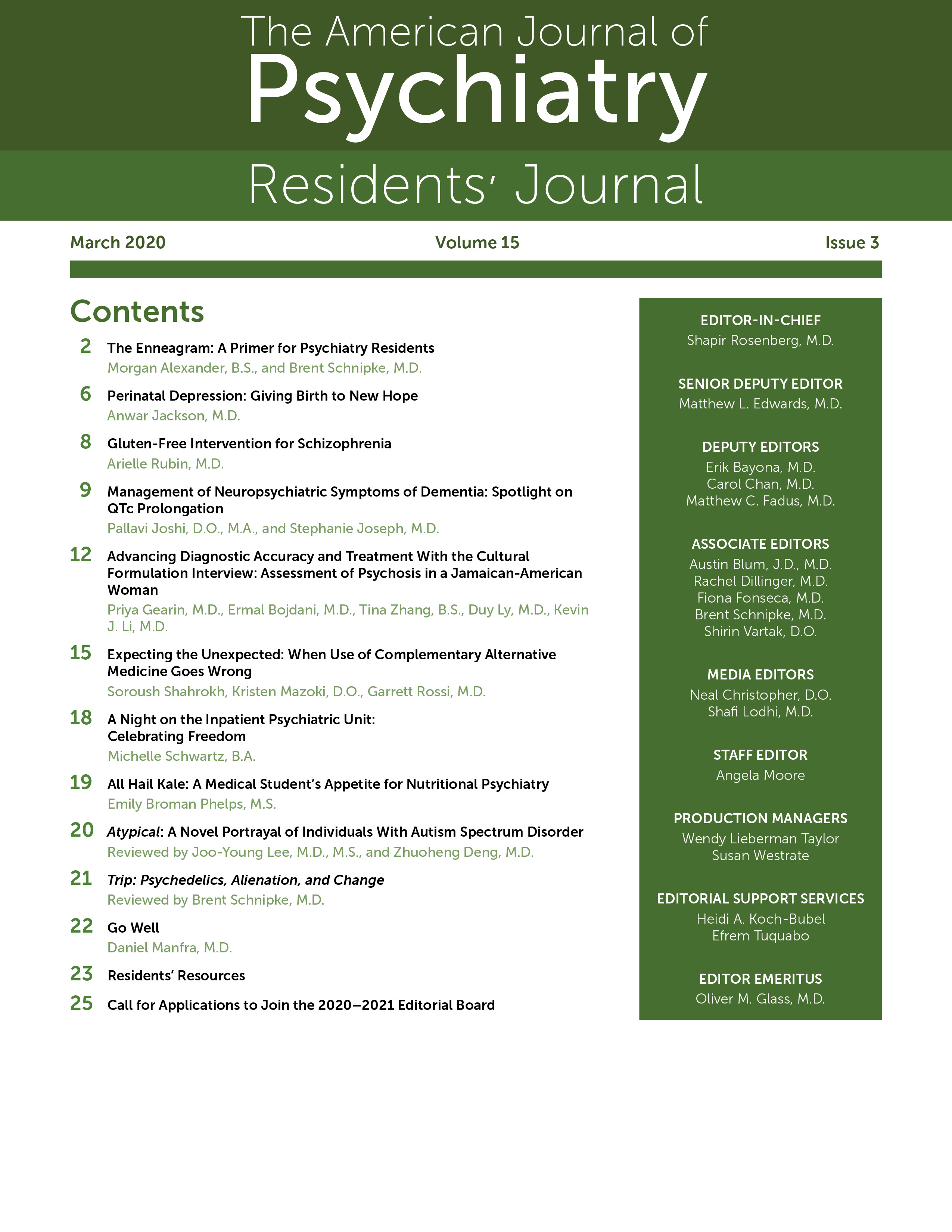Someone recently asked me what brings me joy. Putting aside any pretense of having a unique or sophisticated pastime, I can't help but admit something embarrassingly simple. My most joyous state is eating. My love for food reflects a pride in my identity of having an open mind. Growing up in a picky household, it was my dad and I who ordered the most adventurous thing on the menu. It was our shared way of exploring and experiencing the world.
Maintaining a level of excitement for the food experience has been essential in learning to eat for my body as much as my spirit. As a hopeful psychiatrist, the budding field of nutritional psychiatry has piqued my interest as an application of food science and an adaptive therapeutic tool. Nutritional psychiatry leverages biochemical disease mechanisms to augment mental health treatment with diet. Marx and colleagues (
1) outlined five existing themes of nutritional psychiatry in a 2017 review: inflammation, oxidative stress, brain plasticity, gut microbiota, and mitochondrial dysfunction. The review also highlighted the SMILES trial, a 12-week randomized controlled trial in which participants following a Mediterranean diet showed improvement in depressive symptoms (
2). Matsuoka and Hamazaki (
3) cited similar principles to offer dietary strategies to improve mental health: consume fruits, vegetables, legumes, nuts, and seeds; choose foods rich in omega-3 fatty acids; limit processed and commercial foods; and be mindful of probiotic gut bacteria.
Reading about the gut–brain axis and brain nutrition, I'm inspired to incorporate a nutritional focus into my clinical work. After watching Dr. Drew Ramsey's Ted Talks, I ordered his cookbook, Fifty Shades of Kale. To the tune of Bubba Gump Shrimp, there's about a million things you can do with kale. Dr. Ramsey praises kale not only for its density of vitamin A, omega 3 fat, and phytanic acid but also for its culinary versatility. In his cookbook, kale is camouflaged in the unlikely confines of cream cheese, cocoa, and cocktails. As someone who's burned her fair share of kale chips, I relished a rather foolproof first course: a kale salad with unordinary additions of blueberries, carrots, and hazelnuts and a lemon juice dressing.
Perusing a vibrant book with pictures that made me salivate and inventive recipes, I felt an energy that transcended the pages (remember, about kale). It was an anticipation that I will try something surprisingly tasty while soaking in cerebral vitality. I'm eating for my brain. I sat in that feeling for a moment to ponder the hopefulness of a patient. The permissiveness of creativity. The insight of new food. Or old food in new ways. I'm barely a bite into appreciating the substance of evidence-based nutrition for depression or anxiety, but I'm imagining the freshness of a new approach to infuse life into an arduous and often trying road to healing.
I hold a conviction that sometimes nutrition just needs new packaging. Greens have remained at the core of a healthy diet, but our approaches and motivations for health offer some diversity of thought. We all have varying forms of self-preservation, likely based in our unique derivations of self-love. As a devoted student, caring for my brain is among the most salient and compelling approaches to health maintenance. Adapting pillars of wellness to focus on the mind is tailored for patients living with mental illnesses and repositions an otherwise fragile sense of autonomy to the end of the fork. As I enter medicine, I've realized that my health choices reflect my integrity, and perhaps the most compelling nutrition narratives I can offer stem from my willingness to taste test it myself.
